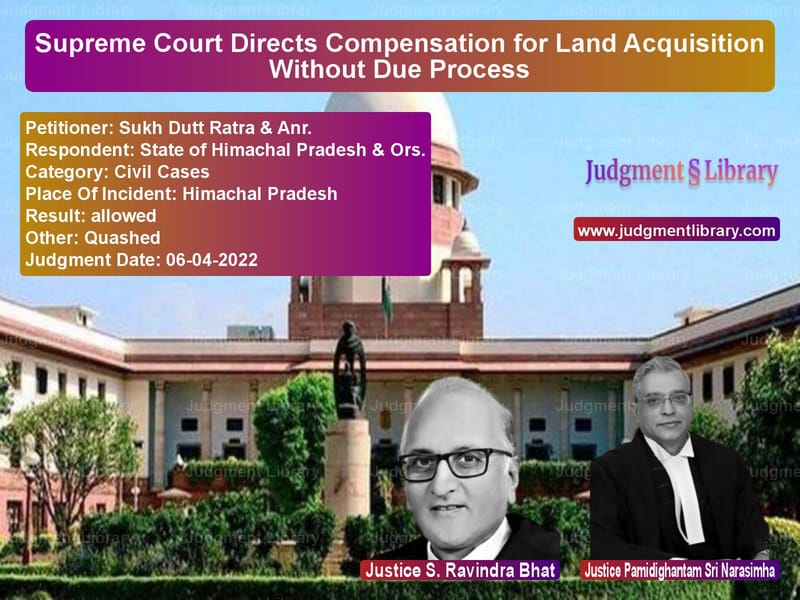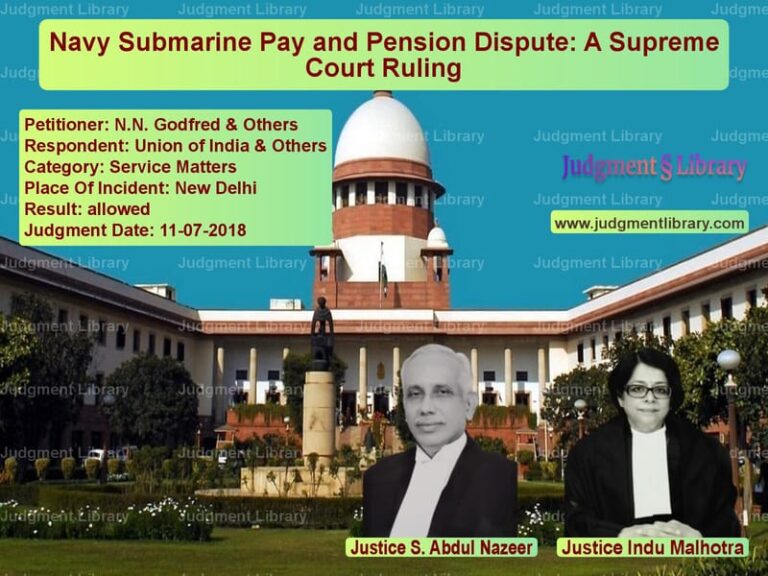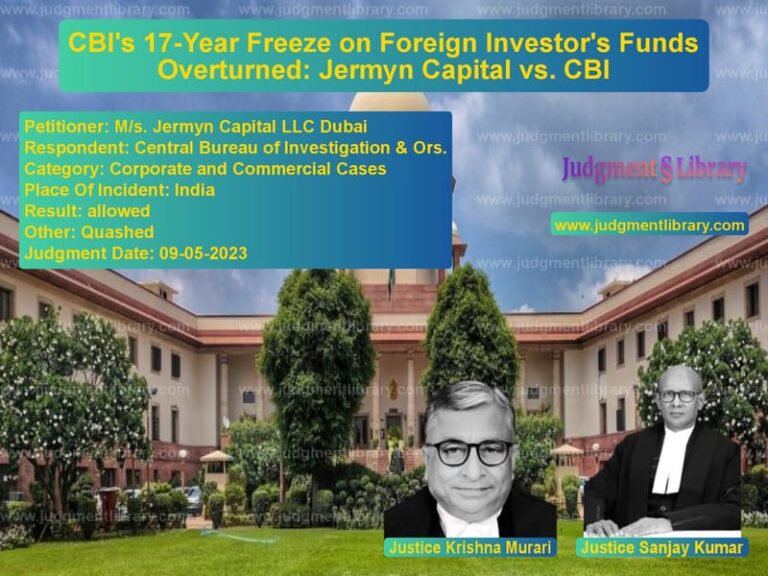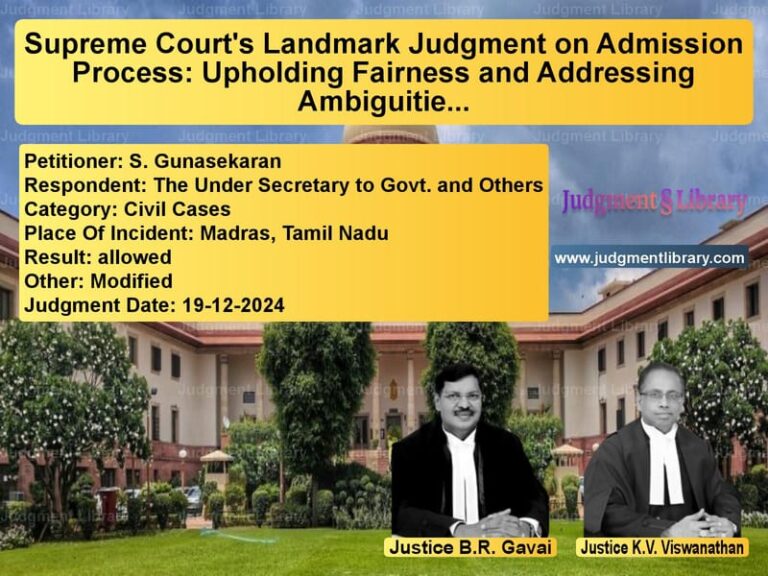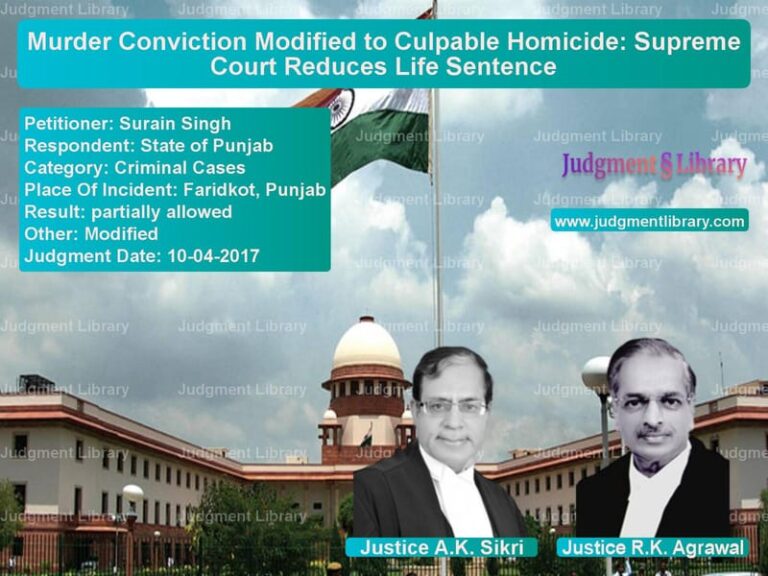Supreme Court Directs Compensation for Land Acquisition Without Due Process
The case of Sukh Dutt Ratra & Anr. vs. State of Himachal Pradesh & Ors. addressed the critical issue of land acquisition without following due legal procedures. The Supreme Court ruled that the Himachal Pradesh government had illegally taken possession of private land for the construction of a road without acquiring the land through proper legal means or compensating the landowners. The Court ordered that the land be deemed acquired and directed the state government to compensate the landowners as per the applicable rates.
Background of the Case
The dispute arose when the appellants, Sukh Dutt Ratra and Bhagat Ram, claimed ownership of land in Tehsil Pachhad, District Sirmaour, Himachal Pradesh. The Himachal Pradesh government had constructed the Narag Fagla Road on their land in 1972-73 without initiating land acquisition proceedings or compensating them.
Key developments in the case:
- 1972-73: The State of Himachal Pradesh utilized private land, including the appellants’ land, for constructing a public road without initiating land acquisition proceedings.
- 2001: Following a direction from the Himachal Pradesh High Court, a notification under Section 4 of the Land Acquisition Act, 1894 was issued, and an award was passed, fixing compensation at ₹30,000 per bigha.
- 2005: A reference court enhanced the compensation to ₹39,000 per bigha and awarded solatium, additional compensation, and interest.
- 2007-2013: Other landowners with similarly acquired land obtained compensation through writ petitions.
- 2011: The appellants filed a writ petition before the Himachal Pradesh High Court seeking compensation for their land.
- 2013: The High Court dismissed the petition, stating that the matter involved disputed questions of law and fact, and advised the appellants to file a civil suit.
- 2022: The appellants approached the Supreme Court, challenging the High Court’s order.
Petitioners’ Arguments
The appellants, through their counsel Mahesh Thakur, argued:
“The State illegally took over private land without following due legal procedures or compensating the landowners. The High Court erred in dismissing the writ petition, despite clear precedents that landowners must be compensated when land is taken for public use.”
Key points raised:
- The land in question was taken without initiating acquisition proceedings, violating the constitutional right to property.
- Other similarly situated landowners had been awarded compensation through legal proceedings, and the appellants were entitled to the same relief.
- The High Court’s decision to direct the appellants to file a civil suit ignored settled legal principles that allow compensation claims to be adjudicated under writ jurisdiction.
- The government had arbitrarily acquired some parcels of land but ignored the appellants’ land, leading to discriminatory treatment.
Respondents’ Arguments
The State of Himachal Pradesh, represented by Abhinav Mukerji, opposed the appeal, contending:
“The appellants approached the court after an inordinate delay of 38 years. The road was built in 1972-73, and no objection was raised until 2011. This delay renders the claim legally unsustainable.”
Key counterarguments:
- The landowners had given their verbal consent for the construction of the road, making compensation unnecessary.
- The appellants’ land was in District Sirmaour, whereas compensation had been awarded in a different district, making their claim of discrimination invalid.
- Since the landowners had remained silent for decades, they had implicitly acquiesced to the acquisition.
- The appropriate forum for deciding such disputed facts was a civil court, and not a writ petition.
Supreme Court’s Observations
The Supreme Court bench, comprising Justices S. Ravindra Bhat and Pamidighantam Sri Narasimha, ruled in favor of the appellants, emphasizing that no individual should be deprived of their property without proper legal authorization.
The Court stated:
“The right to property, though no longer a fundamental right, remains a constitutional right under Article 300-A. The State cannot take private property without following due process and compensating the landowners.”
Key findings:
- The doctrine of laches (delay in filing claims) does not apply when the State has unlawfully taken possession of private property.
- The principle of parity applies, meaning that landowners in similar situations must be treated equally.
- The High Court erred in directing the appellants to file a civil suit when similar cases had been adjudicated under writ jurisdiction.
- The government’s claim that the landowners had voluntarily given up their land was unsupported by any documentary evidence.
Legal Precedents Considered
The Supreme Court cited various precedents in support of its ruling:
- State of U.P. vs. Manohar (2005): Held that the government cannot take private land without compensating the landowner.
- Tukaram Kana Joshi vs. MIDC (2013): Stressed that the State must comply with legal procedures when acquiring land.
- Vidya Devi vs. State of Himachal Pradesh (2020): Ruled that landowners cannot be deprived of their land without proper acquisition proceedings and compensation.
Final Ruling
The Supreme Court allowed the appeal and ruled:
- The appellants’ land must be treated as deemed acquisition and compensated accordingly.
- The Land Acquisition Collector must determine and pay compensation within four months.
- The appellants shall receive solatium and interest from October 16, 2001 (date of notification under Section 4 of the Land Acquisition Act).
- The Himachal Pradesh government must pay the appellants ₹50,000 as legal costs.
Conclusion
The Supreme Court’s ruling upholds the principle that the government cannot take private property without due process. The decision ensures that landowners who have lost their land to public projects without compensation receive justice, reinforcing constitutional protections under Article 300-A.
Petitioner Name: Sukh Dutt Ratra & Anr..Respondent Name: State of Himachal Pradesh & Ors..Judgment By: Justice S. Ravindra Bhat, Justice Pamidighantam Sri Narasimha.Place Of Incident: Himachal Pradesh.Judgment Date: 06-04-2022.
Don’t miss out on the full details! Download the complete judgment in PDF format below and gain valuable insights instantly!
Download Judgment: sukh-dutt-ratra-&-an-vs-state-of-himachal-pr-supreme-court-of-india-judgment-dated-06-04-2022.pdf
Directly Download Judgment: Directly download this Judgment
See all petitions in Property Disputes
See all petitions in Landlord-Tenant Disputes
See all petitions in Damages and Compensation
See all petitions in Judgment by S Ravindra Bhat
See all petitions in Judgment by P.S. Narasimha
See all petitions in allowed
See all petitions in Quashed
See all petitions in supreme court of India judgments April 2022
See all petitions in 2022 judgments
See all posts in Civil Cases Category
See all allowed petitions in Civil Cases Category
See all Dismissed petitions in Civil Cases Category
See all partially allowed petitions in Civil Cases Category

